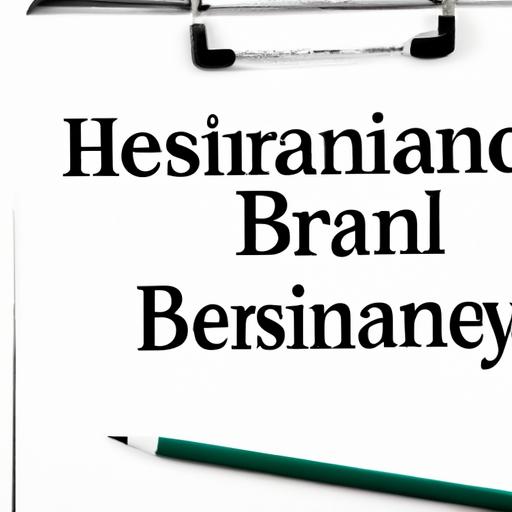In a world where individual lifestyles drive unique health outcomes, the one-size-fits-all approach to insurance premiums may no longer suffice. Enter behavior-based insurance premiums for health – a groundbreaking concept that rewards or penalizes individuals based on their lifestyle choices and behaviors. Could this personalized approach be the key to incentivizing healthier living and reducing healthcare costs? Let’s delve into the world of behavior-based insurance premiums and explore the potential benefits and drawbacks of this innovative approach.
Table of Contents
- 1. Understanding Behavior-Based Insurance Premiums
- 2. How Your Health Habits Can Impact Insurance Costs
- 3. The Benefits of Behavior-Based Premiums in Healthcare
- 4. Factors Influencing Insurance Rates Based on Behavior
- 5. Tips for Improving Your Health and Lowering Premiums
- 6. The Future of Behavior-Based Insurance in Healthcare
1. Understanding Behavior-Based Insurance Premiums
In the world of insurance, behavior-based premiums are becoming more common as insurers look for ways to price policies based on individualized risk factors. Rather than relying solely on traditional factors like age and driving record, behavior-based insurance takes into account specific behaviors and habits of the insured.
By tracking behaviors such as safe driving practices, healthy living habits, and responsible financial decisions, insurers can better assess the likelihood of a claim being filed. This means that policyholders who demonstrate positive behaviors may receive discounts on their premiums, while those with riskier habits may see their rates increase. **Behavior-based insurance premiums** are revolutionizing the industry and encouraging individuals to make better choices for themselves and their communities.

2. How Your Health Habits Can Impact Insurance Costs
It’s essential to understand how your health habits can affect your insurance costs. Your lifestyle choices can directly impact the premiums you pay for health, life, and disability insurance. Making healthy decisions can not only benefit your well-being but also save you money in the long run.
Some ways your health habits can influence insurance costs include:
- Smoking: Tobacco use can significantly increase insurance premiums due to the associated health risks.
- Physical activity: Regular exercise can lead to lower insurance costs as it reduces the likelihood of chronic diseases.
- Diet: A healthy diet can contribute to overall well-being, potentially lowering insurance premiums.
3. The Benefits of Behavior-Based Premiums in Healthcare
Behavior-based premiums in healthcare offer a unique approach to insurance pricing, incentivizing individuals to make healthier choices and ultimately lowering overall costs. By rewarding positive behaviors such as regular exercise, healthy eating habits, and preventive screenings, insurers can encourage members to take charge of their health and well-being. This proactive approach not only leads to healthier populations but also reduces the burden on the healthcare system by preventing chronic diseases and costly medical interventions.
Furthermore, behavior-based premiums can help individuals become more aware of their health choices and empower them to make informed decisions about their lifestyle. Through customized premium structures that reflect individual behaviors, insurers can tailor incentives to each member’s specific needs and goals. This personalized approach fosters a sense of accountability and ownership over one’s health, leading to improved outcomes and a more engaged healthcare consumer.
4. Factors Influencing Insurance Rates Based on Behavior
When it comes to determining insurance rates based on behavior, there are a multitude of factors that insurance companies take into consideration. Your behavior as an individual can greatly impact the amount you pay for insurance coverage. Some key factors that influence insurance rates include:
- Driving Record: Insurance companies look at your driving history to assess the level of risk you pose on the road. If you have a history of accidents or traffic violations, you may be deemed a higher risk and charged accordingly.
- Lifestyle Choices: Certain lifestyle choices, such as smoking or engaging in risky activities, can also impact your insurance rates. These behaviors can increase the likelihood of health issues or accidents, leading to higher premiums.
- Credit Score: Believe it or not, your credit score can also play a role in determining your insurance rates. Individuals with lower credit scores may be charged higher premiums as they are perceived as higher risk.
insurance rates based on behavior are influenced by a variety of factors that reflect your individual habits and choices. By understanding these factors and making positive changes, you can potentially lower your insurance rates and save money in the long run.
5. Tips for Improving Your Health and Lowering Premiums
One way to improve your health and lower your insurance premiums is by maintaining a healthy diet. Incorporate plenty of fruits, vegetables, whole grains, and lean proteins into your meals. Avoid processed foods and sugary drinks. Eating well can help you maintain a healthy weight and reduce your risk of chronic diseases.
Regular exercise is another key factor in improving your health and reducing your insurance costs. Aim to get at least 150 minutes of moderate-intensity exercise each week. This can include activities like walking, jogging, swimming, or yoga. Exercise not only helps you stay in shape but also boosts your mood and overall well-being.
6. The Future of Behavior-Based Insurance in Healthcare
Behavior-based insurance in healthcare is a cutting-edge concept that has the potential to revolutionize the way we approach healthcare. By utilizing data from wearable devices and tracking apps, insurance companies can gather valuable insights into their policyholders’ lifestyles, habits, and behaviors. This data can be used to incentivize healthier choices, ultimately leading to improved health outcomes and reduced healthcare costs.
As technology continues to advance, we can expect to see even more innovative solutions in the realm of behavior-based insurance. From personalized wellness plans to real-time health monitoring, the possibilities are endless. With a focus on preventive care and patient empowerment, behavior-based insurance has the power to shift the healthcare industry towards a more proactive and holistic approach to wellness.
behavior-based insurance premiums for health offer a unique and personalized approach to incentivizing healthy lifestyle choices. By incorporating data and analytics to assess individual behaviors, insurers can tailor premiums to reflect the habits and risks of each policyholder. This not only promotes a healthier society but also provides a fair and transparent system for determining insurance rates. As this innovative approach continues to evolve, it will be exciting to see how it positively impacts the health and well-being of individuals around the world. Thank you for exploring this concept with us. Stay tuned for more insights and developments in the world of behavior-based insurance premiums.
